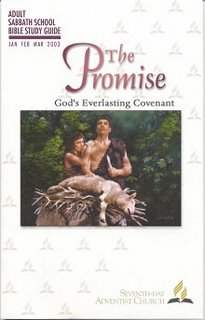
In Open Letter to Elder Clifford Goldstein Peter Williams on AToday.com concludes with these words:
It has been stated that if the SDA church threw out its 1844 teaching it would have to throw out The Great Controversary and in doing so would virtually destroy the memberships’ faith in Ellen White. This is possible correct. The church cannot say sorry we were wrong. It hasn’t said sorry to Desmond Ford, Robert Grieve or Fletcher.
Wouldn’t it be better to say sorry and start again with a truth filled Evangelical Gospel message than to continue deceiving people with the doctrines of Men?
Finally, I would remind you of the words of the quarterly Friday July 14, “as Christians we must take the word for what it says as opposed to what humans say.” After 160 years isn’t it about time we did just that and preached according to scripture?
After this quarter's journey in SDA anti-contextual reading of Daniel and it's total abandonment of New Testament Gospel in that we teach an Investigative Judgment which neither Christ or the Apostles preached the Lesson Quarterly moves on to teach more fundamentalism. The Lesson for Friday Oct 6 quotes Ellen White:
"The work of higher criticism, in dissecting, conjecturing, reconstructing, is destroying faith in the Bible as a divine revelation. It is robbing God's word of power to control, uplift, and inspire human lives. By spiritualism, multitudes are taught to believe that desire is the highest law, that license is liberty, and that man is accountable only to himself. . . .
"The power of a higher, purer, nobler life is our great need."—Ellen G. White, The Acts of the Apostles, pp. 474, 478.
The Lesson wants to present the supremely literalist view of Genesis, holding that it is foundational to everything else, as it states on Sunday Oct 1:
Are we going to listen to the critics who come up with all sorts of "evidence" to question the historical veracity of Genesis, or do we follow the lead of those like Jesus and Paul and Peter, who showed unquestioned faith in the book? Indeed, to question the veracity of Genesis means to question the veracity of the New Testament, which time and again refers to Genesis. How reliable could the New Testament be if it were all wrong about Genesis? As we can see, once we start questioning the historical veracity of the Genesis account, the whole edifice of faith crumbles. Which, of course, is exactly what Satan wants.
There are a couple of points here, first as you read the lesson you see a couple of references to Satan yet Satan is never mentioned in the the Pentateuch and only very rarely in the entire Old Testament. Yet you can see just how foundational it is to the teaching of this lesson. You can't really have it both ways, holding to historical veracity of the Genesis account and using talking snakes. The reason we see Satan as that talking snake is because of a verse in the book of Revelation "that serpent of old" which is a highly symbolic book which freely uses symbols from many religious traditions. It is ancient myths that use talking animals not accounts of historical veracity. Which leads us into the realm of higher criticism. It is not the fearful feature that fundamentalist make of it, it is merely the use of context and culture to arrive at meaning.
Higher criticism is "the study of the sources and literary methods employed by the biblical authors."
Lower criticism is "the discipline and study of the actual wording" of the Bible; a quest for textual purity and understanding.
And even the fundamentalist will use it though instead of using more scholarly evidence they will base their expansion of culture and context upon a particular tradition they have embraced. It is their poor use of Higher Criticism which causes their distrust of Higher Criticism. For example again from the lesson on Monday Oct 2:
Before the Flood came, He had Noah preach many long years, giving everyone an opportunity to be saved.
If you read the foundational Flood account in Genesis you see two significant things which contradict the Lesson's statement. One it says no where that Noah preached to anyone and it gives no amount of time about Noah before the flood. In the New Testament Noah is referred to as a "Preacher of Righteousness" which could mean he preached to people or it could mean that his life was an example of righteousness. As the Expositor's Bible Commentary says:
Noah was a herald (keryx) of righteousness. This could refer to his preaching activity not recorded in the OT or to the fact that his lifestyle condemned sin and proclaimed righteousness to his contemporaries (Gen 6:9).
But fundamentalism does not want to take into account other possibilities then it has laid out by its own tradition. So the fundamentalist view says Noah preached for 120 years. Taking those years out of context from Genesis verses before the flood story is even told. If you have not realized yet these traditions are not drawn from the Bible but from Ellen Whites account. The tradition is that Ellen White's views have supplanted the actually Biblical account. Much the same way that the Investigative Judgment became a tradition in the SDA church quite apart from the Biblical context of Daniel 8:14. You may recall (at the top of this page) a graphic example of this on the cover of the 2003 quarterly depicting Adam and Eve sacrificing a lamb, something never found in the foundational book of Genesis yet mysteriously acceptable to the powers that be who commission the art for the quarterly. Non Biblical tradition is the enemy of Christianity it was the cry of the Reformation and it needs to be our Reformation Cry also.

